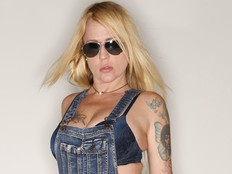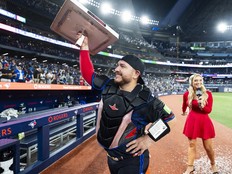‘Alien: Earth’ delivers Xenomorph terror with a ‘Peter Pan’ twist

Article content
This review contains mild spoilers for “Alien: Earth,” Season 1.
– – –
FX’s new “Alien” prequel, “Alien: Earth,” batters viewers expecting Xenomorph horror from an additional, less expected angle: The series is practically drowning in “Peter Pan” metaphors that don’t quite work.
That’s partly by design; this is a show about infelicitous hybrids. What happens when things combine that once couldn’t, and perhaps shouldn’t?
The Pan references come mostly from a nefarious young trillionaire named Boy Kavalier (Samuel Blenkin) who founded Prodigy, one of the five major corporations controlling the globe. He relishes reading J.M. Barrie passages aloud to his “Lost Boys,” a group of six powerful and virtually immortal synthetic creatures into whom Kavalier’s company has transferred the consciousnesses of six dying children. A prodigy himself, Kavalier theorizes that children have greater flexibility and potential. So while the “synths,” his prototype for this version of human immortality, look like adults, they behave and speak like the kids they once were.
The first of these (and Kavalier’s favorite) is a sprightly, charming synth named Wendy (Sydney Chandler), whom we first meet as Marcy (Florence Bensberg), a thoughtful 12-year-old girl losing her battle to cancer. As the “eldest,” she mentors and leads the other five: Slightly (Adarsh Gourav), Smee (Jonathan Ajayi), Curly (Erana James), Nibs (Lily Newmark) and Tootles (Kit Young).
The micro-society these hybrid beings form is as appealing as the grim, merely human society portrayed on-screen is predictable, ugly and impoverished. Ajayi, Gourav and Chandler are particularly good at channeling their characters’ childlike worldview, and the setting the synths inhabit is just plain fun. Fans of Hawley’s show “Legion” know how much the writer-director loves a swanky supernatural training camp. The Lost Boys accordingly live on an idyllic Jurassic Park-style island called Neverland that feels aesthetically and tonally distinct from the dim, oppressive dystopias of the Alien franchise. There the six synths are tended, cosseted and monitored by a maternal psychiatrist of sorts named Dame Silvia (an underused Essie Davis), her husband Arthur (David Rysdahl), who handles most of the science, and Kirsh (Timothy Olyphant), an older synthetic who manages the mission, the island’s security, and – to the extent that he can – Kavalier’s impulses and moods.
You might be wondering how this story could productively intersect with the world we know from the other Alien films. Indeed, clocking in at only eight episodes, “Alien: Earth” does feel a tad overstuffed. It is also, however, philosophically interested in unnatural hybrids, whether those are cyborgs, synths or newer, more horrifying trans-species combinations.
It’s fitting, therefore, that the character narratively linking these two plots – Marcy’s (now Wendy’s) older brother, working off his corporate debt as a lowly soldier-medic – is named Hermit (Alex Lawther). Known for climbing into vessels that are not theirs and operating from within, the hermit crab’s modus operandi becomes a central metaphor for the series.
That isn’t new terrain for the franchise; in fact, it maps nicely onto that scene in “Aliens” where Sigourney Weaver’s Ripley dons an armored, body-shaped forklift to fight the alien queen. But it is a slightly different spin on the genre’s usual kind of body horror. Hawley’s series is less interested in predatory parasitism (or incubation, or rape) than in occupation – specifically, the proposition that consciousness and identity can remain unaffected by whichever body “you” take on.
That said, there’s plenty of gore and the aliens certainly don’t get short shrift. “Alien: Earth” is set in 2120, two years before the events of Ridley Scott’s 1979 “Alien,” and the series opens much like the original, with a crew unhappily manning a (different) Weyland-Yutani spaceship called the USCSS Maginot. They’re on a 65-year mission transporting a set of specimens for the Yutani Corporation (one of Prodigy’s four corporate rivals). Production designer Andy Nicholson is eerily faithful to the look and style of the original; even the cryopods look the same. The vibe, too, is similar, with the worn-down crew members acting more like exhausted truck drivers than space officers as they wearily discuss fractions of shares. The pilot only delivers slivers of the story viewers will come to know, and I won’t get into the alien plot to avoid spoilers, but there’s plenty of Xenomorph carnage.
There is, in any event, a crash. The Maginot lands on a building belonging to Boy Kavalier, and the plot really gets going when Hermit ends up at the crash site on a search-and-rescue mission. Alerted to the presence of alien species on board, Kavalier decides to try to contain them himself, rather than hand them over to Yutani. That bureaucratic spat between trillionaires is the official pretext for much that transpires on the series.
The show isn’t perfect. An initially promising rivalry between two of the show’s more interesting and powerful characters – Morrow (Babou Ceesay), a cyborg working for Yutani, and Kavalier’s deputy Kirsh – ends up feeling more arbitrary than cathartic. Ceesay’s exceptional performance benefits from a script that gives him space to break down. Olyphant’s character, by contrast, remains a tantalizing cipher for much of the series. But because it isn’t clear what a synthetic of his vintage feels or “wants,” his rare outbursts are more confusing than compelling.
Chandler is the series MVP. As Wendy, her old attachment to her brother Hermit drives much of the action. That’s hard to do without coming across as saccharine or cloying. Playing a kid-made-synth, Chandler needed to anchor and humanize a number of thought experiments: Does identity remain unaffected by the body it occupies? What will children do if given adult bodies and superhuman capabilities? How much does giftedness alienate (pun intended) the ordinary, and vice versa? She brings so much energy and charisma and curiosity and upstart authority to the role that she successfully camouflages some uglier features of her character’s arc.
In fact, if the series has a major flaw, it might be its failure to narratively temper Wendy’s magnetism, which sometimes destabilizes and decenters the franchise’s usual focus on (and commitment to) corporate dystopias. I keep coming back to a tonally weird moment in the finale in which two minor characters, both workers and victims of the hyper-capitalistic hellscape the series otherwise critiques, die in a predictably terrible way. The moment lands as celebratory. It felt like show itself had at that point been taken over by a perspective that wasn’t quite its own.
– – –
Alien: Earth premieres with two episodes Aug. 12 on Disney+











Postmedia is committed to maintaining a lively but civil forum for discussion. Please keep comments relevant and respectful. Comments may take up to an hour to appear on the site. You will receive an email if there is a reply to your comment, an update to a thread you follow or if a user you follow comments. Visit our Community Guidelines for more information.